
Corruption and Cambodian Households
Publication Year: 2010 / Sources: PACT CambodiaThe 2010 Corruption and Cambodian Households survey (A quantitative household survey on Perceptions, Attitudes, and Impact of Everyday forms of Corrupt Practices in Cambodia)
The result suggests positive signs in the fight against corruption in Cambodia. Perception of public services and integrity of service and political institutions in Cambodia has improved considerably since an earlier survey in 2005. In particular, there has been a remarkable shift in attitudes towards public services such as health, education, public registry and business licensing. Even perceptions regarding police officers and judges, who scored lowest on the survey, have improved considerably.
Download: English | Khmer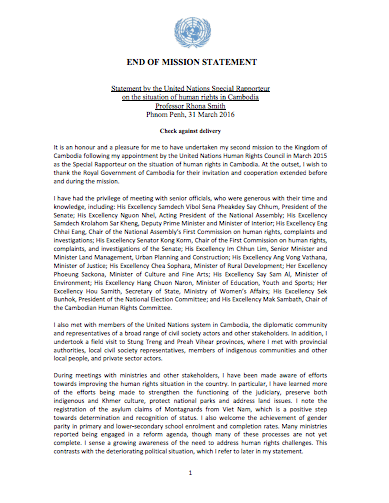
Statement by the United Nations Special Rapporteur on the situation of human rights in Cambodia
Publication Year: 2016 / Sources: Professor Rhona Smith - United Nations Human Rights CouncilThe United Nations Special Rapporteur on the situation of human rights in Cambodia, Rhona Smith, called on the Cambodian authorities to further strengthen the protection of women and indigenous peoples’ rights in the country.
Download: English | Khmer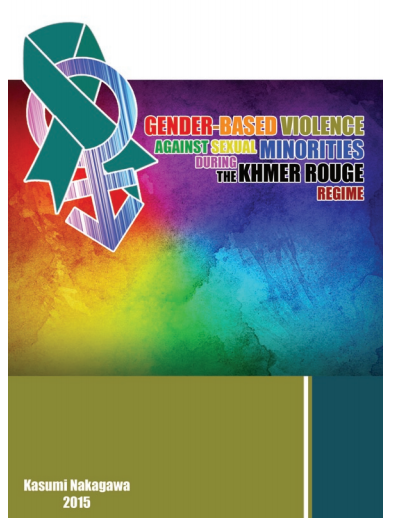
Gender-Based Violence Against Sexual Minorities During the Khmer Rough Regime
Publication Year: 2015 / Sources: Kasumi Nakagawa, Cambodian Defenders Project (CDP)During the Khmer Rouge (KR) regime in Cambodia, people belonging to sexual minorities, examined as Lesbian, Gay, Bisexual and Transgender people (LGBT), were forced to experience specific forms of gender-based violence and sexual violence that were not experienced by the majority of Khmer people. (…) The motivation to conduct this pioneering research started with my strong commitment to break the culture of denial of basic human rights of sexual minorities in Cambodia. Enabling the voices of the most marginalized group to be heard can contribute to empowering older victims of the KR and youth alike.
Discourse and research about gender-based violence in the Khmer Rough Regime has focused almost exclusively on violence perpetrated against women. The KR regime was the period when the government with extreme communism forced people in cities to move to rural areas.
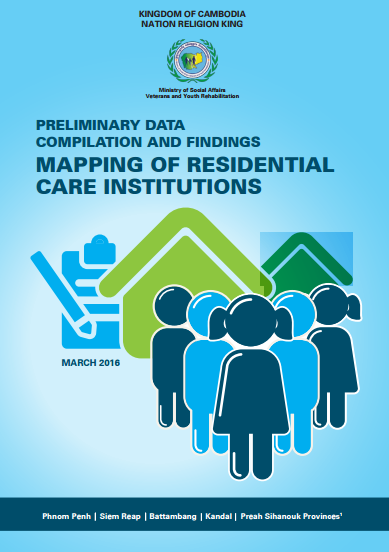
Preliminary Data Compilation and Findings Care Institutional Mapping of Residental
Publication Year: 2016 / Sources: Ministry of Social Affairs, Veterans and Youth RehabilitationThis report focuses on the 267 residential care institutions that meet the standard definition of a residential care institution as described in Annex 1. Briefly, residential care is a group living arrangement for children who have been abandoned or cannot stay with their biological families or relatives in communities, and where care and services are provided by remunerated adults.
Download: English | Khmer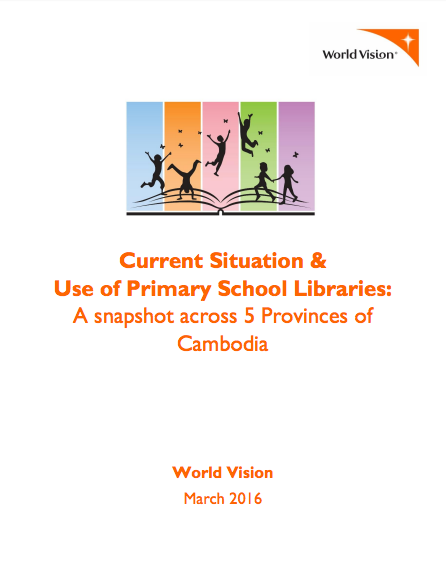
Current Situation & Use of Primary School Libraries: A Snapshot Across 5 Provinces of Cambodia
Publication Year: 2016 / Sources: World VisionWorld Vision has a comprehensive approach to improve learning outcomes, and especially reading skills, in 650 primary schools in 9 provinces. Across a sample of 24 schools, this brief study is intended to provide a snapshot of library facilities and usage in selected schools in 11 districts across five provinces where World Vision has been working with citizens, schools, government, and partner NGOs to improve basic education.
Download: English | Khmer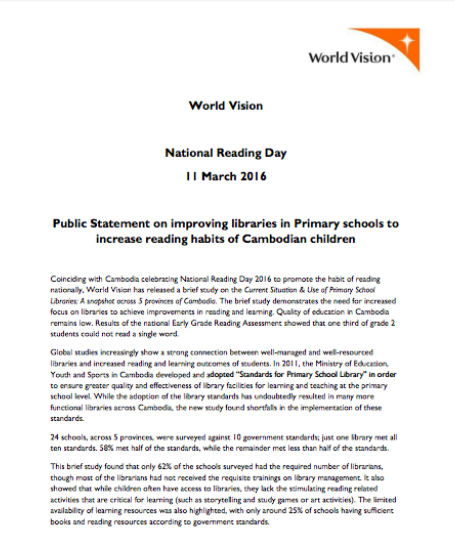
Public Statement on Improving Libraries in Primary Schools to Increase Reading Habits of Cambodian Children
Publication Year: 2016 / Sources: World VisionCoinciding with Cambodia celebrating National Reading Day 2016 to promote the habit of reading nationally, World Vision has released a brief study on the Current Situation & Use of Primary School Libraries: A snapshot across 5 provinces of Cambodia. The brief study demonstrates the need for increased focus on libraries to achieve improvements in reading and learning. Quality of education in Cambodia remains low.
Download: English | Khmer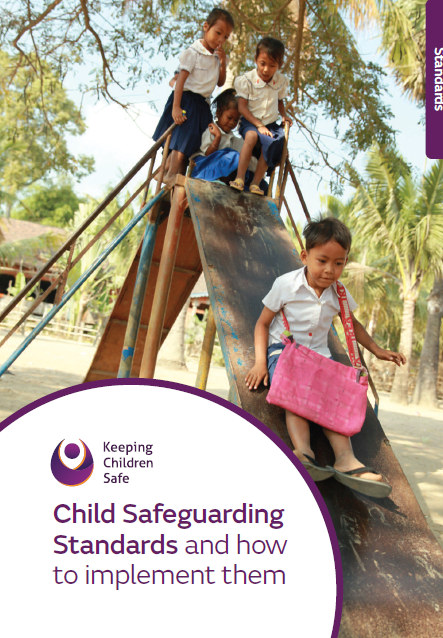
Child Safeguarding Standards and How to Implement Them
Publication Year: 2014 / Sources: Keeping Children SafeThe first Child Safeguarding Standards were launched over 12 years ago by a coalition of relief and development charities that later became known as Keeping Children Safe.
Download: English | Khmer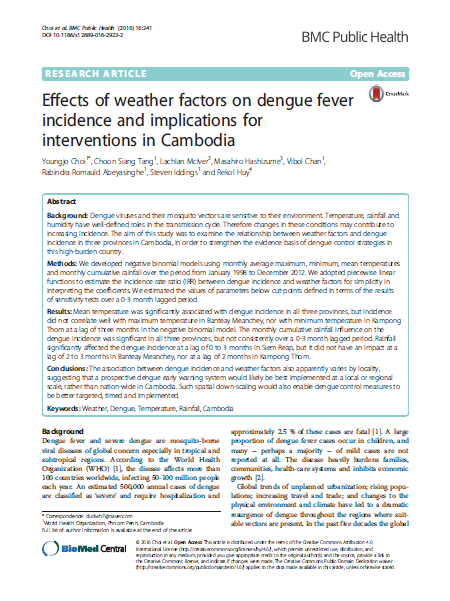
Effects of Weather Factors on Dengue Fever Incidence and Implications for Interventions in Cambodia
Publication Year: 2016 / Sources: BioMed Central Public HealthDengue viruses and their mosquito vectors are sensitive to their environment. Temperature, rainfall and humidity have well-defined roles in the transmission cycle. Therefore changes in these conditions may contribute to increasing incidence. The aim of this study was to examine the relationship between weather factors and dengue incidence in three provinces in Cambodia, in order to strengthen the evidence basis of dengue control strategies in this high-burden country.
Download: English | Khmer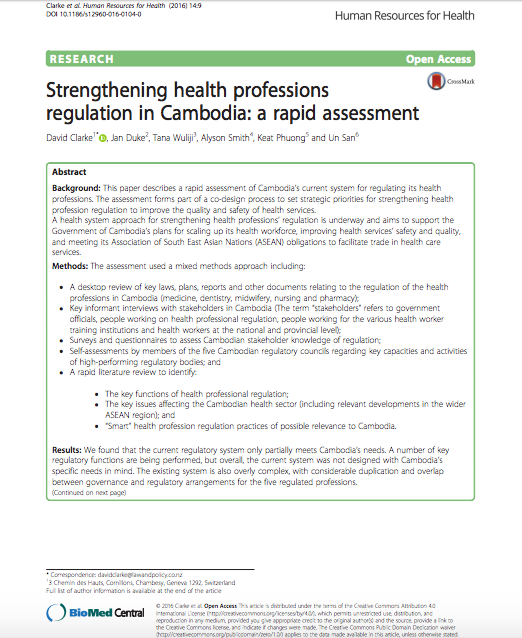
Strengthening Health Professions Regulation in Cambodia: A Rapid Assessment
Publication Year: 2016 / Sources: Human Resources for HealthThis paper describes a rapid assessment of Cambodia’s current system for regulating its health professions. The assessment forms part of a co-design process to set strategic priorities for strengthening health profession regulation to improve the quality and safety of health services.
Download: English | Khmer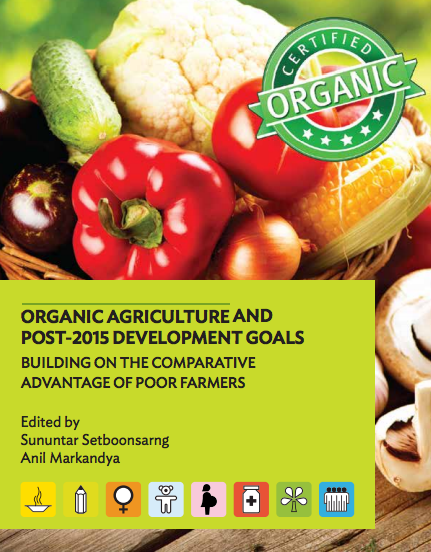
Organic Crops or Energy Crops? Options for Rural Development in Cambodia and the Lao People’s Democratic Republic
Publication Year: 2015 / Sources: Asian Development BankUsing the cases of the Lao People’s Democratic Republic (the Lao PDR) and Cambodia, this chapter compares the two options for the development of organic agriculture and biofuel with respect to a set of development goals—the focus of which includes not only the narrow economic benefit to the farmers, but also their impact on health, poverty reduction, the environment, and sustainable development overall. There is considerable interest in both these farming enterprises in the two countries, and the public and private sectors are already engaged in a range of activities related to them.
Download: English | Khmer